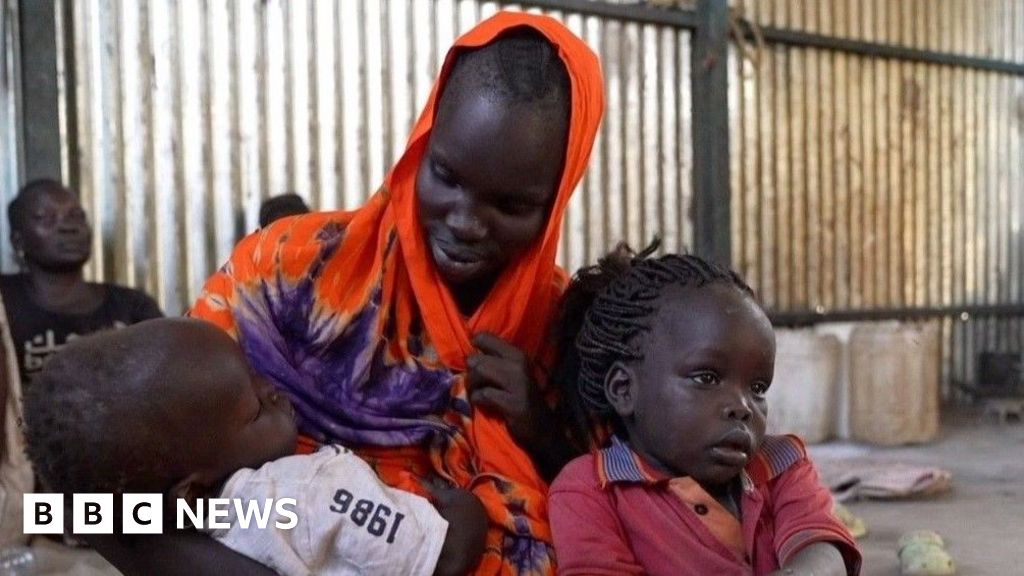BBC News, Renk
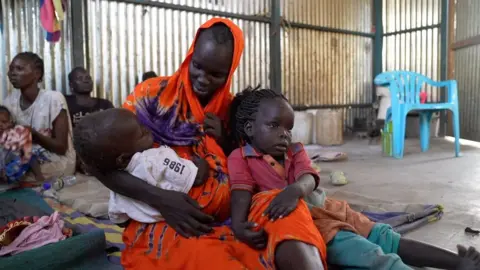 Hassan Lali / BBC
Hassan Lali / BBCWhen the devastating war in Sudan reached Sarah Williams’ neighbourhood in the capital Khartoum, she and her children were caught in the crossfire.
Bullets tore through their home, fires engulfed buildings, and electricity lines sparked explosions.
“We were crawling on the ground,” she recalls, holding her one-year-old son close. “It was chaos.”
Ms Williams, a 33-year-old mother of five, is from South Sudan.
She was forced to flee when civil war erupted in 2013, two years after it gained independence from Sudan, to become the world’s newest nation.
But the post-independence euphoria soon dissipated, when a power struggle between President Salva Kiir and his deputy Riek Machar triggered a civil war that claimed the lives of an estimated 400,000 people and forced 2.5 million people to flee their homes.
Ms Williams was among them. After arriving in what was then a peaceful Khartoum, she rebuilt her life, working as a housekeeper for a middle-class family.
But she was uprooted again after fighting erupted in the city in 2023 between forces loyal to military ruler Abdel Fattah al-Burhan and his then-deputy Mohamed Hamdan Dagalo, better known as Hemedti.
“The conflict started among themselves,” Ms Williams says. “But later, they began killing South Sudanese also, even though we weren’t part of their fight.”
In the past two years, the conflict in Sudan has claimed more than 150,000 lives, forcing more than 12 million people from their homes, and turning large parts of Khartoum into rubble.
When her home came under attack, she packed her few belongings and headed back to South Sudan.
However, conflict has now resumed there too, with the United Nations (UN) warning that the 2018 peace agreement between Kiir and Machar is at risk of collapsing.
Ms Williams’ journey has ended, for now, in Renk. A once quiet dusty border town, it has turned into a transit hub, heaving with refugees from both Sudan and its neighbour to the south.
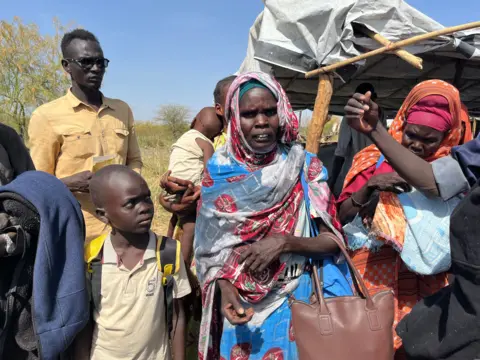 Hassan Lali / BBC
Hassan Lali / BBCStranded in Renk for about five months, Ms Williams wants to return to her hometown, Nasir, in Upper Nile State.
However, it is unsafe to travel to Nasir – a strategically important port town along the Sobat River – as it has turned into a war zone.
“There’s conflict ahead of us,” she tells the BBC, holding her four-year-old daughter while gently rocking her one-year-old son.
Her voice is steady, but her eyes are heavy – carrying the weight of war, loss, and uncertainty.
Government troops and the White Army – a militia allied with Machar during the civil war – have repeatedly clashed in Nasir, with reports of heavy shelling, ambushes, and displacement of residents.
Ms Williams has not heard from her family in the town.
“I don’t know where they ran to when the clashes started… or even if they’re alive,” she says quietly.
The fighting in South Sudan has left thousands of people like Ms Williams stranded at the Renk Transit Centre. The camp is overcrowded, accommodating more than 9,000 people – three times the number it was designed for.
Refugees are given a small amount of cash by aid agencies to buy food, but it lasts for only two weeks and they are then expected to fend for themselves.
Sarah says she and other refugees were then forced to chop down trees to sell as firewood, so that they could raise money for food
“I used to collect firewood and sell it to buy flour, but there’s nothing left in the forest now. No wood for women to collect and sell,” Ms Williams says – a reminder of the environmental degradation that war causes.
Corrugated shelters at the camp squeeze in up to 15 people per room. Others build fragile homes from sticks, cloth, and torn sacks. Overcrowding is fuelling disease, hunger and despair.
Aid agencies are scrambling to move families to safer parts of South Sudan, where people have “stronger community or family ties, livelihood opportunities, and better access to services”, says Vijaya Souri of the International Organization for Migration (IOM).
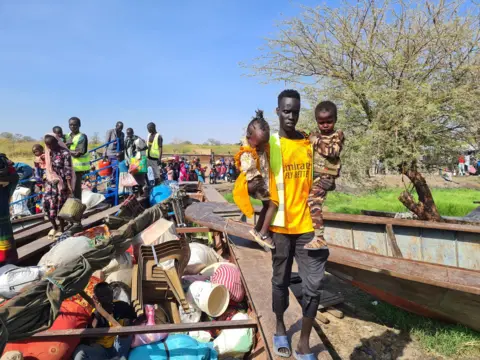 Hassan Lali / BBC
Hassan Lali / BBCHundreds wait under a scorching sun to board metal boats bound for Malakal. The journey takes two and a half days down the River Nile. Passengers sit on their luggage or the floor of the boat.
Among them is Mary Deng, who escaped from Wad Madani, a fierce battleground in the Sudanese conflict.
“This child was just one day old when we crossed the border,” she says. “We are 16 in total. We had no money – but we had God.”
She clutches a bundle of documents – her family’s ticket out of Renk.
Medical services are stretched to their limits. The Joda border clinic – built from iron sheets – is the only functioning health centre in the area.
“Over 600 babies have been born here since the war began,” says a health worker. “But we can only operate during the day now, there’s no funding for night shifts.”
A cholera epidemic was declared in Renk last October. It spread across most of South Sudan, including the capital Juba, causing more than 450 deaths.
Tatek Wondimu Mamecha, the World Health Organisation’s (WHO) emergency officer in South Sudan, warns of the growing risks.
“Even though the cholera outbreak is controlled, we’re not out of the woods. Right now, malaria is spiking and with the rainy season coming, it will shoot up,” he tells the BBC.
Mr Tatek adds that the ripple effects of global aid cuts by US President Donald Trump’s administration are devastating.
“Five of our partners either stopped service or reduced operations by 50%.”
Hospitals like Renk Referral have lost half their staff, including surgeons, obstetricians, paediatricians, putting an enormous strain on the remaining medics.
“The facility manages around 350 to 400 patients a day,” Mr Tatek says.
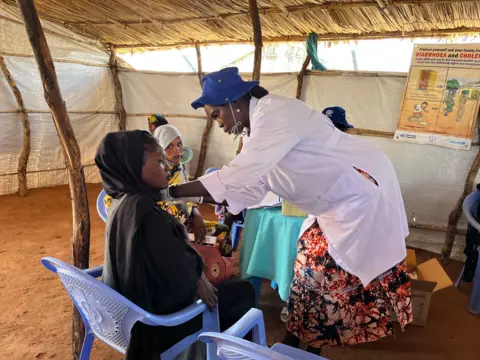 Hassan Lali / BBC
Hassan Lali / BBCThe refugee crisis in Renk brings into sharp focus the fact that tens of thousands people are trapped between two conflicts, with parts of South Sudan no longer a safe haven for people fleeing the two-year conflict in Sudan.
Tensions have escalated in South Sudan since March when Machar was put under house arrest after being accused by Kiir’s allies of supporting armed groups – a claim his party denies.
George Owino, the chair of a monitoring body set up under the 2018 peace deal to assist in its implementation, has warned that the latest clashes “threaten the foundation of the agreement.”
He tells the BBC the core problem is that political leaders continue to command rival troops, failing to integrate them into a unified national army.
“The link between politics and military power is still intact,” Mr Owino says.
“When leaders disagree, it quickly turns into armed confrontation – exactly what the agreement was supposed to prevent.”
The 2013 civil war broke out after Kiir sacked Machar as vice-president, accusing him of plotting a coup, while Machar made the counter-accusation that Kiir was a “dictator”.
The devastating civil war ended following the 2018 peace deal that saw Machar being reappointed as vice-president.
“There used to be more dialogue within the presidency. That has diminished,” Mr Owino says.
The African Union (AU) has so far failed in its efforts to get the peace process back on track, while Uganda has deployed troops to South Sudan to bolster Kiir’s position.
Machar’s party says the deployment undermines South Sudan’s sovereignty, and the 2018 peace deal.
Both Uganda and Kiir’s government defend the deployment, saying it is in accordance with a long-standing security agreement between the two nations.
Nevertheless, the deployment shows how fragile Kiir’s grip on power is, while fears grow that a full-scale civil war could resume.
And across the border in Sudan, the civil war continues to rage, with Gen Dagalo announcing the formation of a rival government.
His move comes despite the fact that his forces have lost control of Khartoum after heavy fighting. The city is now a burnt-out shell, with bombed and blackened buildings.
Ms Williams says she has no intention of going back to Khartoum, and has decided that it is best to try and rebuild her life in her home country, “even if the situation is bad”.
You may also be interested in:
 Getty Images/BBC
Getty Images/BBCSource link
